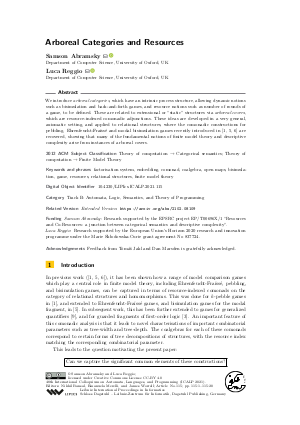Arboreal Categories and Resources
Authors
Samson Abramsky  ,
Luca Reggio
,
Luca Reggio 
-
Part of:
Volume:
48th International Colloquium on Automata, Languages, and Programming (ICALP 2021)
Part of: Series: Leibniz International Proceedings in Informatics (LIPIcs)
Part of: Conference: International Colloquium on Automata, Languages, and Programming (ICALP) - License:
 Creative Commons Attribution 4.0 International license
Creative Commons Attribution 4.0 International license
- Publication Date: 2021-07-02
File

PDF
LIPIcs.ICALP.2021.115.pdf
- Filesize: 0.78 MB
- 20 pages
Document Identifiers
Related Versions
- Extended Version https://arxiv.org/abs/2102.08109
Subject Classification
ACM Subject Classification
- Theory of computation → Categorical semantics
- Theory of computation → Finite Model Theory
Keywords
- factorisation system
- embedding
- comonad
- coalgebra
- open maps
- bisimulation
- game
- resources
- relational structures
- finite model theory
Metrics
- Access Statistics
-
Total Accesses (updated on a weekly basis)
0PDF Downloads0Metadata Views
Abstract
We introduce arboreal categories, which have an intrinsic process structure, allowing dynamic notions such as bisimulation and back-and-forth games, and resource notions such as number of rounds of a game, to be defined. These are related to extensional or "static" structures via arboreal covers, which are resource-indexed comonadic adjunctions. These ideas are developed in a very general, axiomatic setting, and applied to relational structures, where the comonadic constructions for pebbling, Ehrenfeucht-Fraïssé and modal bisimulation games recently introduced in [Abramsky et al., 2017; S. Abramsky and N. Shah, 2018; Abramsky and Shah, 2021] are recovered, showing that many of the fundamental notions of finite model theory and descriptive complexity arise from instances of arboreal covers.
Cite As Get BibTex
Samson Abramsky and Luca Reggio. Arboreal Categories and Resources. In 48th International Colloquium on Automata, Languages, and Programming (ICALP 2021). Leibniz International Proceedings in Informatics (LIPIcs), Volume 198, pp. 115:1-115:20, Schloss Dagstuhl – Leibniz-Zentrum für Informatik (2021)
https://doi.org/10.4230/LIPIcs.ICALP.2021.115
BibTex
@InProceedings{abramsky_et_al:LIPIcs.ICALP.2021.115,
author = {Abramsky, Samson and Reggio, Luca},
title = {{Arboreal Categories and Resources}},
booktitle = {48th International Colloquium on Automata, Languages, and Programming (ICALP 2021)},
pages = {115:1--115:20},
series = {Leibniz International Proceedings in Informatics (LIPIcs)},
ISBN = {978-3-95977-195-5},
ISSN = {1868-8969},
year = {2021},
volume = {198},
editor = {Bansal, Nikhil and Merelli, Emanuela and Worrell, James},
publisher = {Schloss Dagstuhl -- Leibniz-Zentrum f{\"u}r Informatik},
address = {Dagstuhl, Germany},
URL = {https://drops.dagstuhl.de/entities/document/10.4230/LIPIcs.ICALP.2021.115},
URN = {urn:nbn:de:0030-drops-141845},
doi = {10.4230/LIPIcs.ICALP.2021.115},
annote = {Keywords: factorisation system, embedding, comonad, coalgebra, open maps, bisimulation, game, resources, relational structures, finite model theory}
}
Author Details
Funding
- Abramsky, Samson: Research supported by the EPSRC project EP/T00696X/1 "Resources and Co-Resources: a junction between categorical semantics and descriptive complexity".
- Reggio, Luca: Research supported by the European Union’s Horizon 2020 research and innovation programme under the Marie Skłodowska-Curie grant agreement No 837724.
Acknowledgements
Feedback from Tomáš Jakl and Dan Marsden is gratefully acknowledged.
References
-
S. Abramsky, A. Dawar, and P. Wang. The pebbling comonad in finite model theory. In 32nd Annual ACM/IEEE Symposium on Logic in Computer Science (LICS), pages 1-12, 2017.

-
S. Abramsky, R. Jagadeesan, and P. Malacaria. Full abstraction for PCF. Information and computation, 163(2):409-470, 2000.

- S. Abramsky and D. Marsden. Comonadic semantics for guarded fragments. Preprint available at https://arxiv.org/abs/2008.11094, 2020.
- S. Abramsky and L. Reggio. Arboreal categories: An axiomatic theory of resources. Extended version. Preprint available at https://arxiv.org/abs/2102.08109, 2021.
-
S. Abramsky and N. Shah. Relating structure and power: Comonadic semantics for computational resources. In 27th EACSL Annual Conference on Computer Science Logic, CSL, September 4-7, 2018, Birmingham, UK, pages 2:1-2:17, 2018.

- S. Abramsky and N. Shah. Relating structure and power: Comonadic semantics for computational resources. Extended version to appear in Journal of Logic and Computation. Preprint available at https://arxiv.org/abs/2010.06496, 2021.
-
J. Adámek, H. Herrlich, and G.E. Strecker. Abstract and concrete categories. The joy of cats. Online edition, 2004.

-
P. Blackburn, M. De Rijke, and Y. Venema. Modal Logic, volume 53 of Cambridge Tracts in Theoretical Computer Science. Cambridge University Press, 2002.

-
A. Ó Conghaile and A. Dawar. Game comonads & generalised quantifiers. In 29th EACSL Annual Conference on Computer Science Logic, CSL, volume 183 of LIPIcs, pages 16:1-16:17. Schloss Dagstuhl - Leibniz-Zentrum für Informatik, 2021.

-
P.J. Freyd and G.M. Kelly. Categories of continuous functors, I. Journal of Pure and Applied Algebra, 2(3):169-191, 1972.

-
J.M.E. Hyland and C.-H.L Ong. On full abstraction for PCF: I, II, and III. Information and computation, 163(2):285-408, 2000.

-
A. Joyal, M. Nielsen, and G. Winskel. Bisimulation from open maps. Information and Computation, 127(2):164-185, 1996.

-
A. Joyal, M. Nielson, and G. Winskel. Bisimulation and open maps. In Proceedings of 8th Annual IEEE Symposium on Logic in Computer Science, pages 418-427, 1993.

-
T. Kloks. Treewidth: computations and approximations, volume 842 of Springer Lecture Notes in Computer Science. Springer Science & Business Media, 1994.

-
L. Libkin. Elements of finite model theory. Texts in Theoretical Computer Science. An EATCS Series. Springer-Verlag, Berlin, 2004.

-
S. Mac Lane. Categories for the working mathematician, volume 5 of Graduate Texts in Mathematics. Springer-Verlag, New York, second edition, 1998.

-
J. Nešetřil and P. Ossona de Mendez. Tree-depth, subgraph coloring and homomorphism bounds. European Journal of Combinatorics, 27(6):1022-1041, 2006.

- E. Riehl. Factorization systems. Notes available at URL: http://www.math.jhu.edu/~eriehl/factorization.pdf.
-
B. Rossman. Homomorphism preservation theorems. J. ACM, 55(3):15:1-15:53, 2008.

- ACM SIGLOG. Alonzo Church Award, 2017. URL: https://siglog.org/winners-of-the-2017-alonzo-church-award/.
